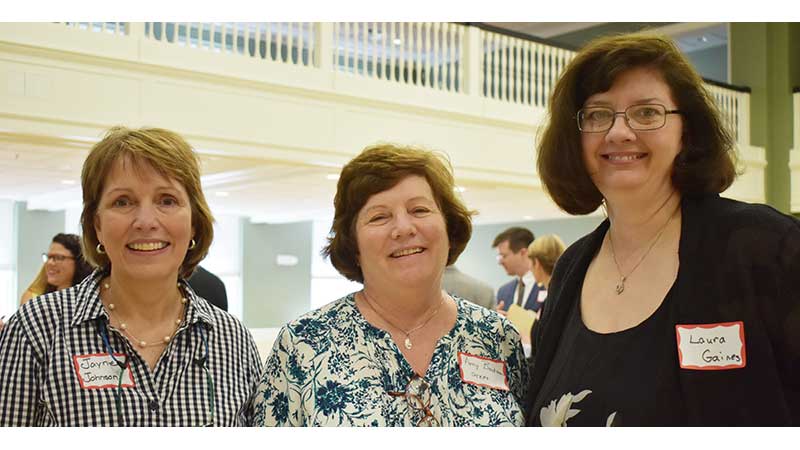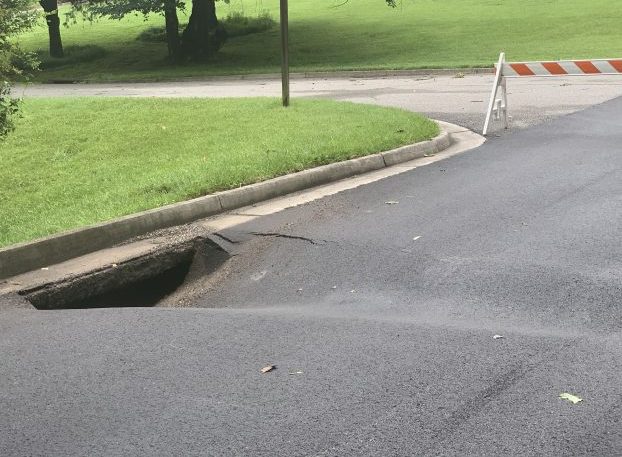Conversation begins on housing
Published 4:15 pm Tuesday, June 12, 2018

- Jayne Johnson, executive director of Farmville Area Habitat for Humanity, stands with Amy Beatson, STEPS’ director of planning and resource development and Laura Gaines, director of development and government affairs at STEPS. (Photo by Emily Hollingsworth)
Approximately 70 representatives from the Commonwealth of Virginia, including several area business owners and nonprofit leaders, opened a conversation about rural housing during a roundtable hosted by Longwood University on June 5.
Gathering around an expansive dining area at the Blackwell Ballroom, participants shared a meal and discussed the triumphs and challenges businesses have experienced in creating housing in Southside Virginia.
The event was organized by the Virginia Rural Center, which is a collaboration between the nonprofit Center for Rural Virginia and the 19-member Council for Rural Virginia.
Trending
After the roundtable, participants got to tour Hotel Weyanoke and Poplar Forest Apartments.
The roundtable examined innovative ways to increase temporary and permanent housing in Virginia, including revitalizing older buildings. Walk2Campus founder Matt King, Poplar Forest Apartment and downtown Farmville Developer William Park, and Ross Finkenscher and Garrett Shifflett of the recently renovated Hotel Weyanoke discussed this aspect.
Park said due to the dwindling pool of options for construction and labor, it can be more expensive to build businesses and homes in rural areas.
He said to establish an environment for market-rate housing, or housing that allows a landlord to set rates, he said developers looks at places with close proximities to a college or university, a hospital and a Super Walmart. He said for affordable or housing for low-income populations, developers would need to consider the U.S. Department of Housing and Urban Development Low-Income Housing Tax Credit.
Park said developers have previously used Research & Experimentation Tax Credit, but said the agency no longer has the needed funding.
“There will always be a need in these rural areas,” Park said. “The challenge is just going to be finding the money to put it together to make it work.”
Trending
Finkenscher said that the approach he and Shifflett have taken to restore old buildings to new life comes with challenges. He said they initially struggled to receive financing for Hotel Weyanoke, a non-chain, boutique hotel in a small town, but he said the support the Farmville community has offered is unmatched.
“Everyone was really behind us, we really felt a positive energy,” Finkenscher said about the said about the community’s support.
Jayne Johnson, executive director of the Farmville Area Habitat for Humanity, said the challenge for the nonprofit is gathering the resources needed to partner with families to build homes. She said Habitat does not rely on public assistance or does not give homes to families, instead partnering with them to create an affordable mortgage plan.
“I welcome this participation and this discussion,” Johnson said. “Because I think our challenge, like I stated before, is being able to partner, work together, put the pieces together to provide safe, decent and affordable housing to the families in our community.”
Kelly Evans, Long-Term Services and Supports (LTSS) Housing Outreach Specialist for Anthem Inc., asked about measures to support accessible housing for elderly people and people with disabilities and chronic illnesses.
“I may be able to find them an actual apartment,” Evans said about her experience working with this population. “But will they have first month’s rent? Will they have a security deposit? And then, will they have assistance to move? … How do we as a group work together to … be able to help them maintain their extended life of living.”
Other suggestions to attract homeowners to rural Virginia included increasing broadband connection, creating a convenient atmosphere to attract millenials and addressing misperceptions of manufactured housing, which participant Erica Sims said can create economic industry through companies that build the homes, and offer a variety of conveniences and flexibility for the homeowner.
Sen. Frank Ruff, who spoke during the event, said the event offers the opportunity to begin and continue a conversation about the housing needs of people in rural Virginia, and how to generate awareness and support from the state about this issue. He noted that rural localities often compete against one another to receive funding.
“Our goal is to start communication and let people understand that if you use your head, that if you work with partners and think outside the box, maybe we can make a difference,” Ruff said.





